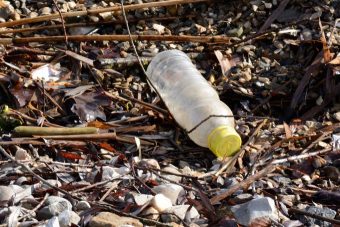
Wildlife along the UK coastline is under threat from mounds of plastic pollution caused by discarded plastic bags, bottles, fishing nets and microplastics, campaigners will warn today.
A two-month expedition by Greenpeace around the coastal waters of Scotland in May and June has uncovered evidence of plastic pollution seriously damaging large swathes of wildlife habitats, including biodiverse areas that are home to seals, puffins, whales, and basking sharks.
The expedition, which ended today in Edinburgh, found beaches strewn with plastic litter, seabirds trapped in tangles of rubbish, and microplastic pollution affecting coastal waters.
Greenpeace is using its findings from the voyage to step up the campaign for a plastic bottle deposit scheme in Scotland, that would see consumers receive payment for recycling drinks bottles across the country.
A trial scheme is already in the works from Coca-Cola after the drinks giant bowed to pressure from campaigners earlier this year, but Greenpeace claims the soft drinks industry as a whole is still guilty of a “woeful lack of action” on plastic waste.
Every day in the UK 35 million plastic bottles are used and discarded, it says.
A petition signed by 25,000 Scots calling for a deposit return scheme for drinks bottles in Scotland will be delivered to Scottish Environment Secretary Roseanna Cunningham later today.
Greenpeace claims similar schemes have pushed the rate of plastic bottle collection up to 95 per cent in other countries, and would represent a major boost in tackling ocean plastic pollution.
A UK-wide petition on the same issue has currently gathered 150,000 signatures.
“It cannot be right that our beaches, seas and the stunning wildlife they are home to should become the final dumping ground for throwaway plastic bottles and other plastic trash,” Tisha Brown, oceans campaigner at Greenpeace UK, said in a statement. “With a truckload of plastic entering the ocean every minute, we need urgent action from governments and from major soft drinks companies which produce billions of single-use plastic bottles every year, like Coca-Cola, to stop the flow of plastic into the sea.”
Greenpeace said samples of the scientific trawls made on the trip will now be sent to the University of Exeter for further analysis, with full results to be published later this year.
Source: businessgreen.com

